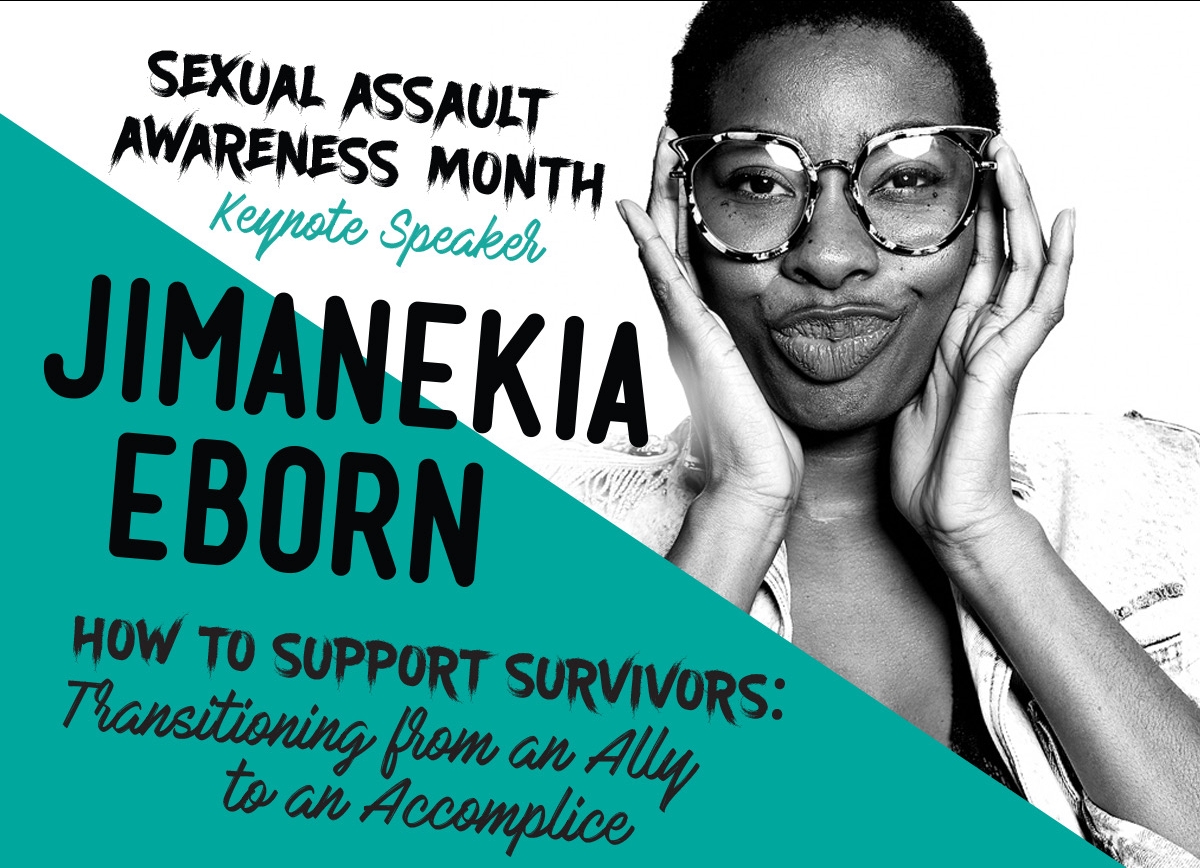
From ally to accomplice: Jimanekia Eborn to educate TU students on how to support sexual assault survivors
By: Grace Coughlan, Associate Editor
Towson University will be hosting “Sexual Assault Awareness Month Keynote- How to Support Survivors: Transititioning from an Ally to an Accomplice” on Thursday, April 1 at 5:30 p.m. to support the beginning of Sexual Assault Awareness Month (SAAM).
Jimanekia Eborn, sex edcuator and sexual assault & trauma expert, is the guest speaker for the event. She will be talking about how to support sexual assault survivors.
“I was reached out to a few months ago about creating something for the school,” Eborn said. “It was a beautiful conversation that allowed openness and support. The main focus was to really support the students that may be survivors and take the weight off survivors. By teaching and supporting others to show up for these survivors in our lives.”
According to Allison Seeley, staff coordinator from Sexual Assault Peer Educators (SAPE) and co-chair for the Sexual Harassment and Assault Prevention Education (SHAPE) Committee, the talk will be centered not only around support of, but the impact of sexual violence.
“[Eborn] plans to discuss the difference between an ‘ally’ and accomplice’ and I’m personally excited to learn more about that distinction,” said Seeley. “Our aim with this event is to spotlight survivor voices of advocates working on sexual violence topics that impact college students, yet are not always centered in the discourse on campus sexual violence.”
Eborn explained that teaching more on how to be an accomplice can be beneficial for survivors.
“I believe that if we have stronger accomplices that know how to show up for folks, the healing process for survivors looks different and the amount of harm can go down,” Eborn said. “It is not all on the survivor to do the work. And of course it should not be.”
The event will be taking place virtually through Zoom and participants will have the option to ask Eborn questions at the end of the keynote.
According to Elizabeth Purswani, assistant director of programming for the office of student activities, it’s essential to provide events that promote topics that impact students.
“For the past 4 years we have supported The Health Center in their Sexual Assault Awareness Month programming, specifically with supporting the keynote speaker,” Purswani said. “It’s important for the Office of Student Activities to not only plan events that are about community, inclusion and fun, but to plan and support events such as this that talk about such important topics.”
Seeley explained that there are present statistics of sexual violence in college.
“According to national studies, we know that approximately 26% of college senior women, 6% of college senior men, and 30% of transgender, gender queer, and gender non-conforming seniors have experienced sexual violence while in college,” Seeley said. “So it’s important that we share information on how to support survivors because chances are, many college students will know someone (or already do know someone) who has experienced sexual violence.”
Eborn highlighted the fact that society doesn’t necessarily relay constructive information.
“When they think they are helping people, they are actually harming them,” Eborn said. “For instance, in college they teach us knowledge is power. So why not teach us information about the harm that is being caused everyday? I believe having these conversations in a space and with folks that are vulnerable to experiencing sexual harm is super helpful.”
According to Eborn, it’s crucial to direct an inclusive conversation about sexual assault.
“We truly have to change the narrative that sexual assault is just a woman’s issue,” Eborn said. “Or that you should care only because someone has a mom or a sister. All bodies, all ages, all genders can cause harm and can be harmed by others.”
Eborn indicated that she wants this keynote event to serve as a reflection for students on their thoughts and actions.
“I want students and whomever else who attends to walk away self reflecting and wanting to be better,” Eborn explained. “I think we should always want to strive to be better and be continuously evolving. I want to focus on the understanding that survivors are not broken sheep, that we are all humans that have had something traumatic happen to us, and that we are not our trauma.”
According to Seeley, TU offers multiple resources for students who’ve experienced sexual assault. For students looking to speak with someone confidentially, TU’s Counseling Center offers individual and group sessions. They can be reached at 410-704-2512.
If students need medical attention, TU’s Health Center provides testing for sexually transmitted infections (STI), emergency contraceptives, and treatment to minor injuries. Students can schedule appointments by calling 410-704-2466.
The National Sexual Assault Hotline operates 24/7 and provides phone and chat options.
Seeley explained that students have the option to report sexual assault or violence to TU.
“If someone would like to make a report of sexual violence to the university they can do so by contacting the Title IX Office at 410-704-0203 or titleix@towson.edu,” Seeley said. “The Title IX Office can help students, faculty, or staff who’ve experienced sexual violence with interim measures and accommodations such as no contact orders, emergency housing, academic adjustments, etc.”
To register for “Sexual Assault Awareness Month Keynote- How to Support Survivors: Transititioning from an Ally to an Accomplice,” visit TU’s website.


Your point of view caught my eye and was very interesting. Thanks. I have a question for you. https://www.binance.com/pl/join?ref=W0BCQMF1
Your article helped me a lot, is there any more related content? Thanks!